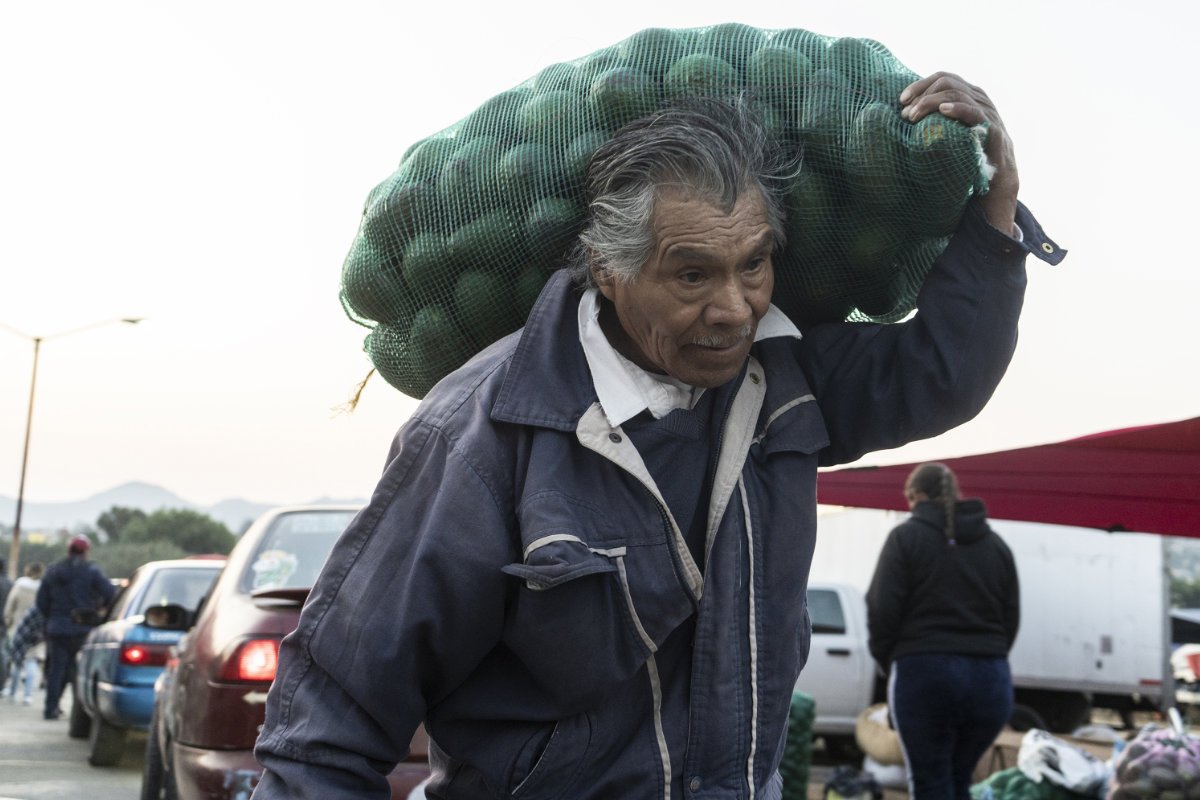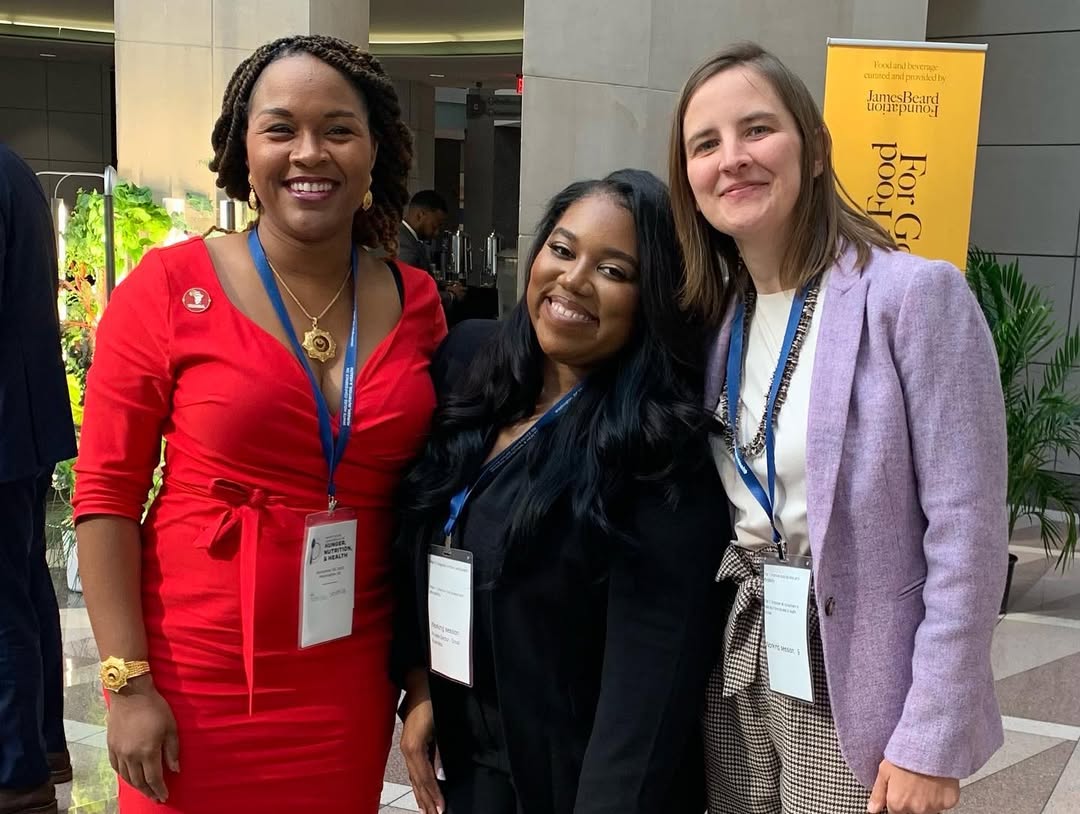Most avocados sold in the U.S. come from Mexico, where farming methods have serious environmental and human-rights impacts. Yet importers continue to market the fruit as sustainably grown.

Most avocados sold in the U.S. come from Mexico, where farming methods have serious environmental and human-rights impacts. Yet importers continue to market the fruit as sustainably grown.
July 9, 2025

A man carries a sack of avocados at a market in Mexico in February. The United States imports the vast majority of its avocados from Mexico, and experts say orchards there add to land dispossession and degradation. (Photo credit: Cristopher Rogel Blanquet/Getty)
Avocados are a regular part of many consumer’s weekly shopping—a key ingredient in guacamole, a slice on the side of a buddha bowl, and a healthy topper for toast—and sales are steadily rising.
Expand your understanding of food systems as a Civil Eats member. Enjoy unlimited access to our groundbreaking reporting, engage with experts, and connect with a community of changemakers.
Already a member?
Login
But there’s a dark side to this booming market. Nearly all avocados sold in the U.S. are imported, and most of those come from just two western Mexican states—Michoacán and Jalisco—where serious concerns are being raised about their environmental and human impacts.
A 2023 investigation by the NGO Climate Rights International found vast tracts of forest being cleared for avocado plantations, water being diverted to irrigate the thirsty crop, and evidence of the mucky fingerprints of organized crime.
It concluded that virtually all deforestation for avocados in Michoacán and Jalisco over the past two decades was illegal. As a result, the report holds the industry liable for taking a serious toll on local communities, contributing to land grabs and water shortages, degrading the soil, and increasing the risks of lethal landslides and flooding.
A follow-up study the following year with the Mexican NGO Guardián Forestal concluded that little had changed. Now, U.S. avocado growers and consumer groups are accusing major fruit firms of falsely portraying imported fruit as a sustainable option.
The non-profit Organic Consumers Association (OCA) fired the first shots, filing lawsuits in 2024 against four of the biggest avocado importers: Calavo, Mission, West Pak, and Fresh Del Monte. These companies import avocados from Mexico and supply them to major supermarket chains throughout the U.S., including Costco, Walmart, Trader Joe’s, and Whole Foods. OCA claims statements on these companies’ websites and social media that their avocados are sourced responsibly and sustainably are untrue.
Alexis Baden-Mayer, political director of OCA, notes that all imported avocados must be labeled with the country of origin, but that’s often the only truthful statement conveyed to the consumer. “The impact of avocado farming is a carefully guarded secret that the companies conceal with elaborate greenwashing,” she said. “That’s what we took action against.”
In February, Calavo Growers, Mission Produce, and West Pak Avocado pledged not to buy avocados grown on recently cleared land as part of a new Mexican certification scheme.
OCA subsequently dropped its case against West Pak, saying the company had agreed to stop using the “challenged marketing claims and to employ enhanced due diligence mechanisms to identify and stop sourcing from orchards in Mexico identified as existing on land that has been deforested since January 1, 2018.”
But it maintains that the other three companies continue to mislead the public. The lawsuit against Del Monte was allowed to proceed in February after a court denied the company’s attempt to dismiss it, rejecting arguments that the link between OCA and Del Monte was too tenuous to bring a claim. The other two claims, against Calavo and Mission Produce, are still pending.
The Del Monte lawsuit notes that people are becoming increasingly concerned about the impacts of their food. Consumers, says the filing, are motivated to buy produce marketed as “sustainable” and are often willing to pay more for it or to buy more of it. “Corporations that market these products, such as Del Monte, are keenly aware of this consumer willingness,” the filing states.
OCA says it is bringing the claim on behalf of consumers in the District of Columbia and is not seeking monetary damages. Instead, it wants the court to declare Del Monte’s practices false and deceptive and to order it to stop.
In Southern California, a group of companies that own and operate avocado orchards—Kachuck Enterprises, Bantle Avocado Farm, Maskell Family Trust, and Northern Capital—were growing increasingly frustrated about being undercut by importers. They were already reeling from poor domestic harvests, growing utility costs, tougher regulatory requirements, and a shortage of skilled labor, and having to compete with cheaper imports reduced their profitability even further.
Norm Kachuck is CEO of Kachuck Enterprises, and his family and partners have farmed 370 acres of Hass avocados in Valley Center, California, since 1969. He thinks consumers generally realize they’re eating avocados that have travelled from outside the U.S. But they’re “only now becoming aware of the implications of how that sourcing compromises the attractiveness of that imported fruit,” he said.
In February, the California firms jointly filed a lawsuit against Mission, Calavo, and Fresh Del Monte.
The California-based avocado growers say the companies mislead consumers by marketing their avocados as sustainable, even though the fruit comes from orchards where the local environment is being destroyed through deforestation, water shortages, soil degradation, and biodiversity and habitat loss.
They also say dubious sourcing of avocados contributes to climate change through deforestation and the subsequent loss of a natural carbon sink. This, the lawsuit claims, breaches California’s False Advertising and Unfair Competition laws.
Kachuck points to a trade imbalance within the agriculture sector. “Regulatory oversight and validation of good practices are very difficult to document for compliance over the border,” he noted, “They are of course done much better here. And there are validated and official fair market agreements between wholesalers and retailers that require documentation and compliance.”
From the OCA lawsuit against Del Monte: “Based upon Mexican government shipping records, in 2022, Del Monte sourced 49,394 kilograms from orchards in the municipality of Zacapu, Michoacán, shown in the images below. Satellite photography from May 2012 shows native forest covering this land; photography from October 2020 shows the land deforested and replaced with an avocado orchard from which Del Monte sourced avocados.”
The importing companies have filed requests for dismissal. If the court rejects those, the case will rumble on to the discovery phase, where both sides will exchange information pertinent to the trial.
None of the companies subject to lawsuits responded to requests for comment. Reuters was also rebuffed by nine major U.S. supermarkets and food chains it contacted in a report last year about avocado supply chains; only Amazon’s Whole Foods Market responded in that report that it was actively working with its suppliers to “prioritize Fair Trade certified and other responsibly sourced avocados.”
Awareness of the impact of imported avocados is growing. Following concerns raised by Senator Peter Welch (D-Vermont) and others, then U.S. ambassador to Mexico, Ken Salazar, noted the proliferation of orchards on illegally deforested land during a visit to Michoacán last year. He was reported as saying that Mexican avocado exporters “shouldn’t have the opportunity to sell those avocados to the United States market.”
President Joe Biden’s administration subsequently released a policy framework on combatting demand-driven deforestation of all agricultural imports. But OCA’s Baden-Mayer says the Trump administration has not followed through on this. And it has maintained a zero percent tariff on Mexican avocado imports.
Kachuck hopes the lawsuits will raise wider awareness of the impacts of avocado growing in Mexico among the public and consumers, as well as at the government oversight level.
The cases are part of a wider trend of greenwashing litigation, which is increasingly challenging sustainability and carbon-neutrality claims. Earlier this year, one of the U.S.’s biggest sugar firms, Florida Crystals, and its parent company, the Fanjul Corporation, were accused of misleading consumers and endangering public health because they claim to follow environmentally friendly practices, yet undertake pre-harvest burning of crops.
While OCA is gratified that most of the avocado importers it originally sued have pledged to stop contributing to deforestation, Baden-Mayer notes that it is much easier to police false marketing claims than it is to make sure companies follow through on their commitments.
“So far, we’re pleased with the impact and outcome of the cases we’ve brought, but the future for the larger problem of deforestation is uncertain,” she said, recommending that consumers choose California-grown organic and Mexican-grown organic fruit from Equal Exchange when shopping.

July 30, 2025
From Oklahoma to D.C., a food activist works to ensure that communities can protect their food systems and their future.
USDA needs to subsidize avocado farmers if they don’t make this change and bring back US pest inspectors. Then revamp the CA Avo commission that has failed us for the past 14 years. Vote them out!